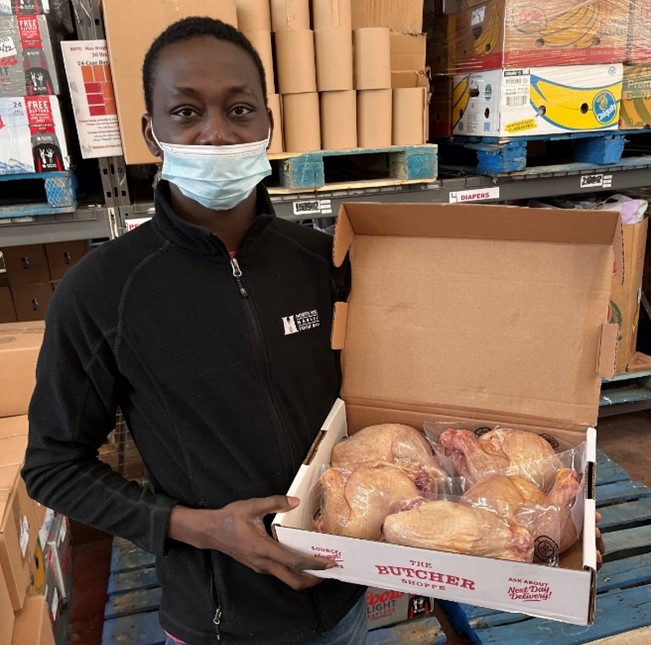Reaching our most vulnerable neighbours with nutritious food when they need it is at the heart of Food Banks Canada’s mission to relieve hunger today and prevent hunger tomorrow.
Across the country, vulnerable groups are continuing to encounter inequitable social and economic conditions. Refugees face extensive disadvantages resulting from their forced displacement.
For many refugees, the complexities of adjusting to a new social structure, economy, and different foodways make them some of the most vulnerable individuals to experience food insecurity.
Adapting to life in a new country can be depleting, which is why it is so imperative to improve access to affordable, culturally appropriate foods that play a significant role in the emotional and mental well-being of newcomers to Canada.
In September 2021, one month after the federal government launched a humanitarian resettlement program for refugees fleeing persecution and conflict in their home country of Afghanistan, Food Banks Canada engaged its partners to respond to the immediate food and settlement needs of asylum seekers arriving in Canada.
With contributions from Walmart Canada and the Walmart Foundation, Food Banks Canada introduced its $200,000 Afghan Refugee Food Support Fund to help food banks and other food security organizations purchase and move culturally appropriate food and community supports.
Food Banks Canada’s Learning & Knowledge Exchange also took action to educate food banks in the national network on the importance of culturally relevant food by holding a free webinar on the topic of “How to Accommodate Different Diets for Food Bank Clients” in February.
As part of the webinar, participating food banks learned that for many Muslim refugees arriving from Afghanistan, culturally appropriate food translates to food that is prepared in accordance with Islamic dietary laws. Islamic dietary laws define foods that are halal, which is the Arabic word for “permissible.”
Through this education and support from the fund especially, food banks across the country have subsequently improved access to culturally appropriate, halal food for Afghan refugees in their communities.
For example, through this scaled-up investment in inclusive, healthy food systems, the North York Harvest Food Bank in Ontario has been able to offer more culturally appropriate food by distributing halal chicken across its network.

In Surrey, B.C., the Muslim Food Bank and Community Services Society (MFBCS) was able to host a welcome event for newly arrived Afghan refugees, with a total of 114 newcomers to Canada in attendance.
Staff of the MFBCS said the event was a huge success. Following the event, newcomers were registered as MFBCS clients, and started receiving support in the form of monthly food hampers and grocery gift cards.
“Food security is essential to integration, mental wellness and health, and finding employment opportunities,” said one staff person of the MFBCS. “If not properly addressed, the strain on diverse local systems can be immense. The emergency hampers take care of the refugees’ critical needs as they persevere through the toughest months of this transition.”
The executive director of the House of Omeed food distribution centre in Burnaby, B.C. also reported being able to enhance food accessibility by improving the food security status of dozens more refugee clients.
“We received a large influx of Afghans right after the Taliban took over and Canada started receiving refugees,” Executive Director Ahmad Zeividavi said. “Because most of the cultural food that we offer needs to be purchased, we are very limited in registering new people and usually have a waiting list. But through this grant, we were able to fast-track over 70 Afghan families and they have been receiving culturally appropriate food tailored to their needs since.”
According to Zeividavi, the funding seemed to inspire hope in the hearts of one newcomer family in particular.
“Shortly after the Afghanistan crisis, we received a phone call about an Afghan family with five children and one on the way who were homeless and sleeping on the airport floor, cold and hungry. Our volunteers and staff quickly swung into action. We found them a warm place to stay, clothes, and Afghan food which brought a big smile to their face. Ever since, they have been served with cultural food each week,” Zeividavi said. “We have helped their kids register for school, helped with the paperwork for the settlement process, and they are going to have a Canada-born baby very soon. We have told them that all their food has been made possible by this generous grant from Food Bank of Canada and Walmart, and the father said, “Every time I enter Walmart, I say, ‘Thank you Walmart!’”
Together, we can ensure that all individuals in Canada, at all times, have access to sufficient, safe, and nutritious food that meets their diverse dietary needs and food preferences.
Donations to Food Banks Canada increase our capacity to support food banks across the national network as they work to provide culturally appropriate food to people experiencing food insecurity. Donate today.